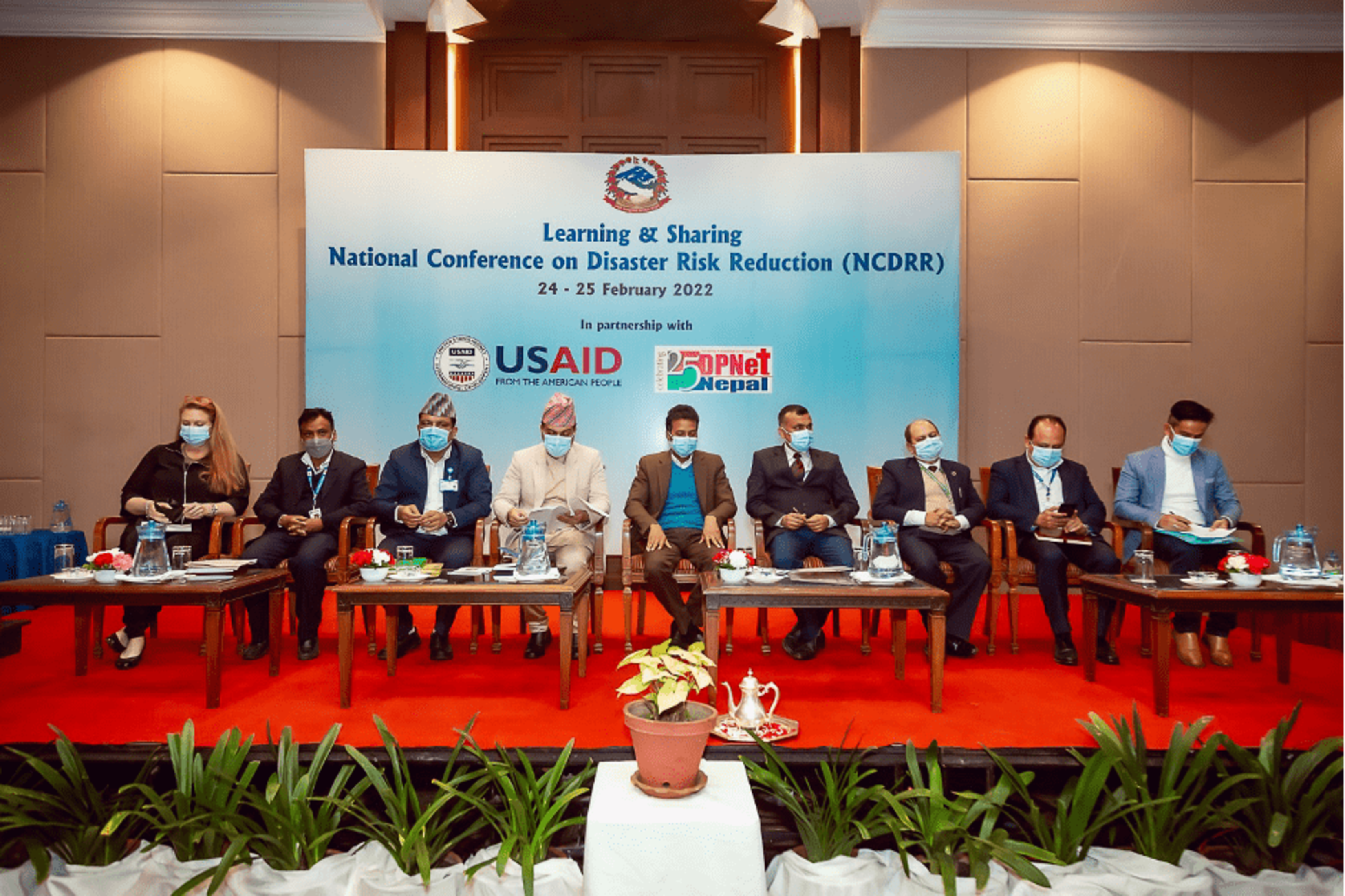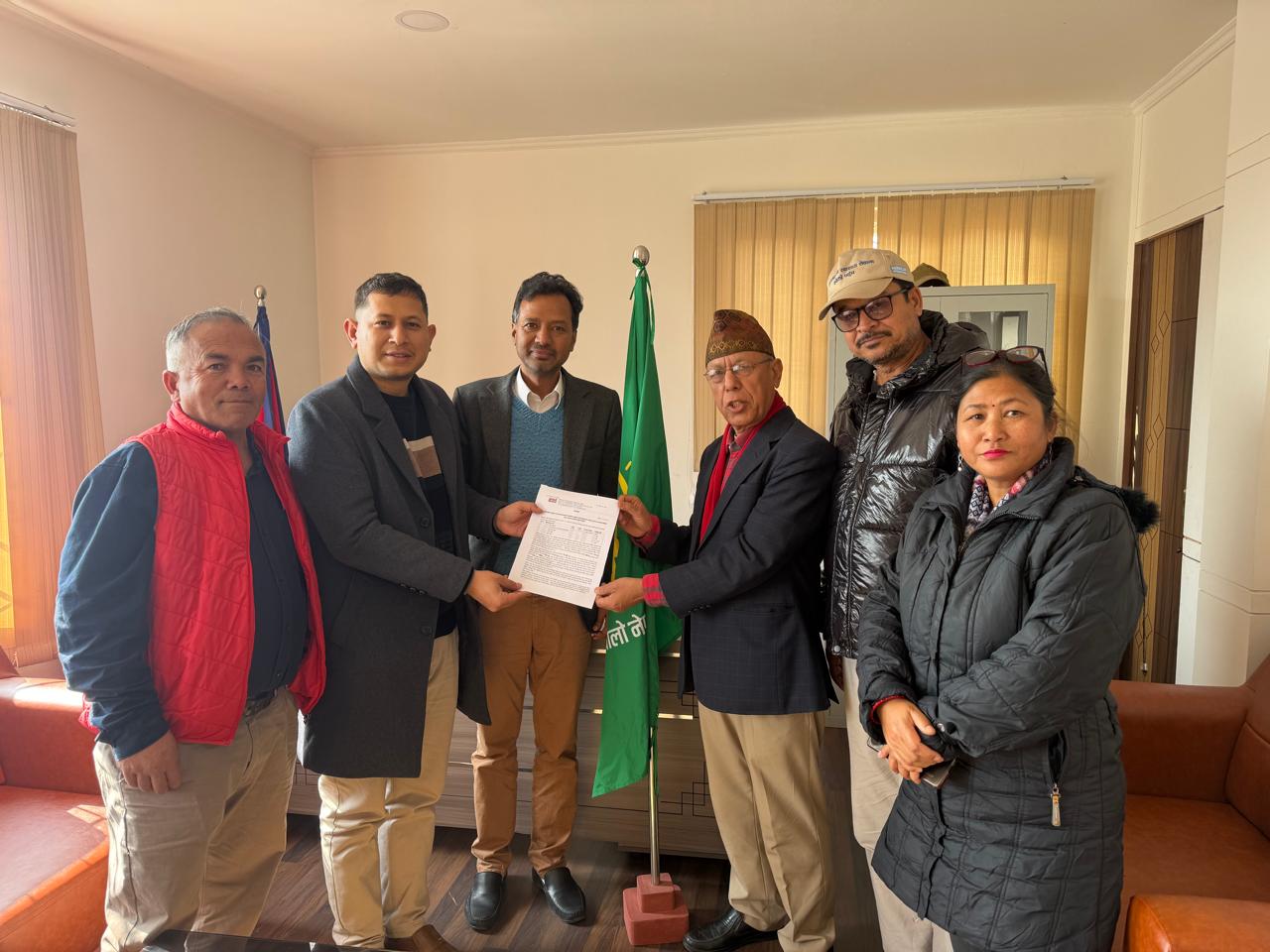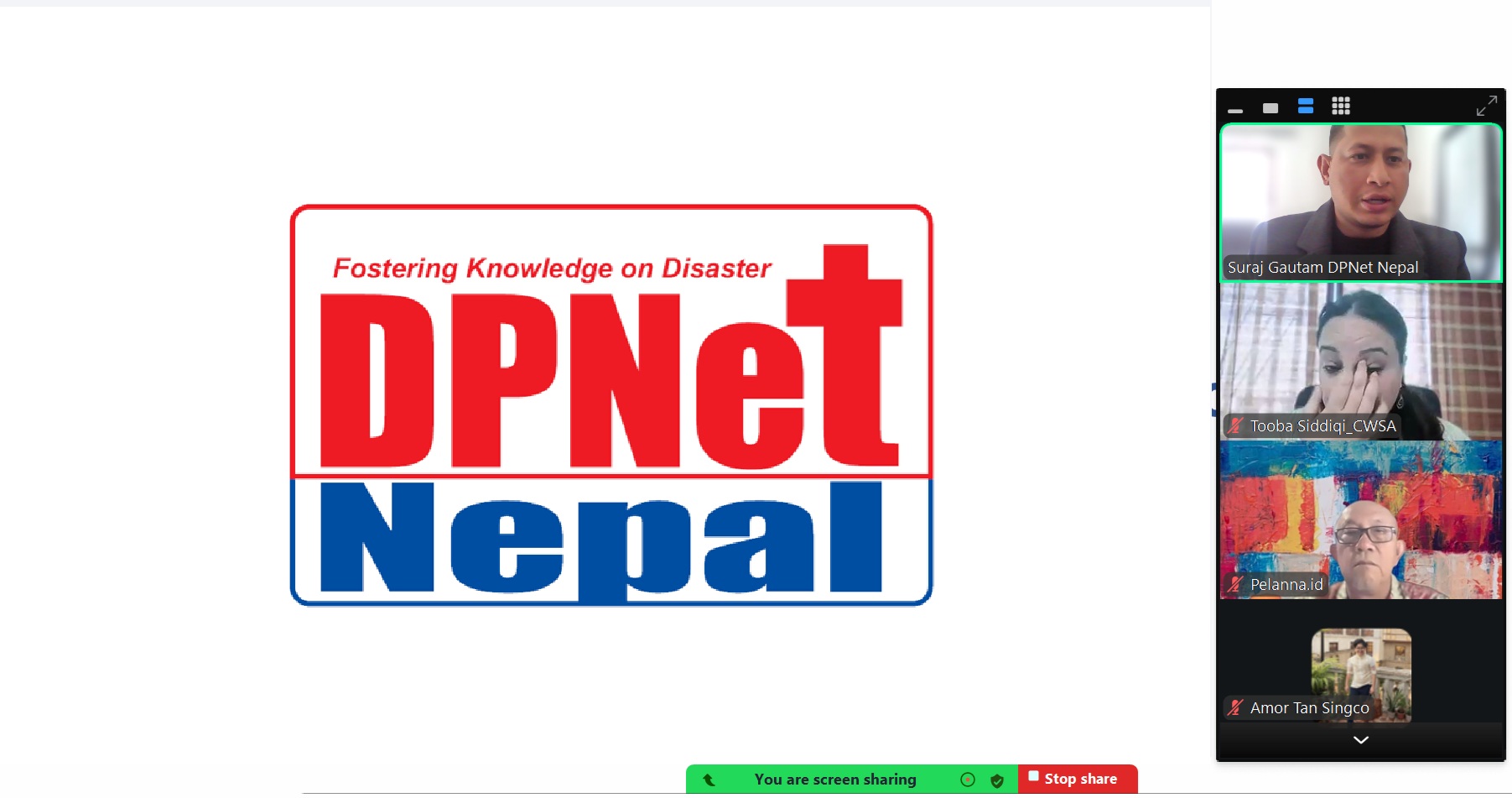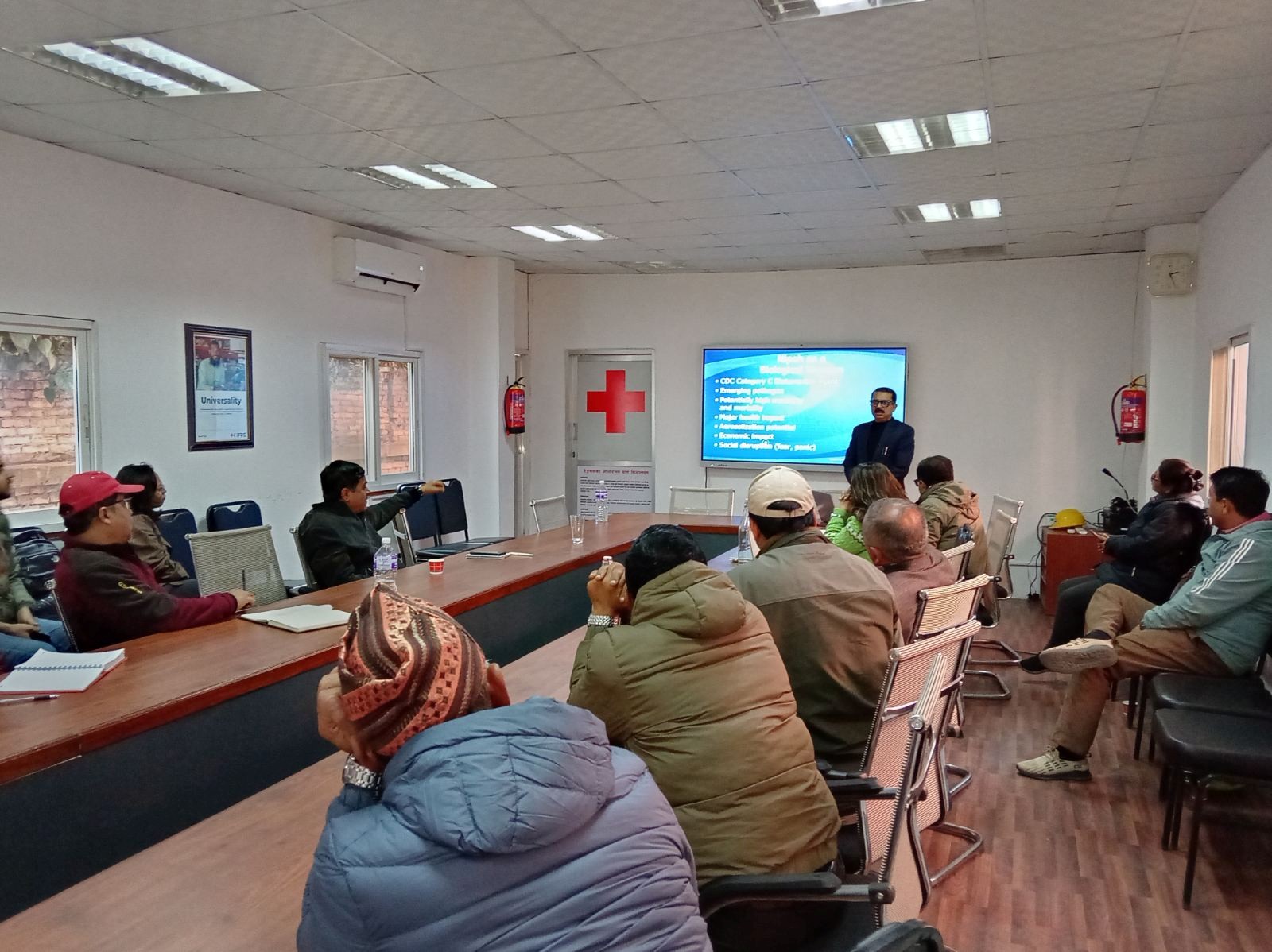Learning & Sharing National Conference on Disaster Risk Reduction (NCDRR)
Feb 27, 2022

The two-day Learning & Sharing National Conference on Disaster Risk Reduction (NCDRR) was organized in Soaltee Hotel, Kathmandu on February 24-25, 2022. Disaster Preparedness Network (DPNet) Nepal, in collaboration with the Ministry of Home Affairs (MoHA), Ministry of Federal Affairs and General Administration (MoFAGA), Ministry of Health and Population (MoHP), Ministry of Urban Development (MoUD), Ministry of Forests and Environment (MoFE), National Disaster Risk Reduction and Management Authority (NDRRMA) and other stakeholders and with the technical and financial support of USAID/Tayar successfully concluded the conference. The first and historical conference aimed to bring out DRR stakeholders in a single platform to discuss and share the contextual issues related to DRR and to prepare for upcoming 'National Conference on Disaster Risk Reduction', 'Global Platform for DRR' and 'Asia Pacific Ministerial Conference on DRR' . Over 200 participants from the diversified background and sectors attended the program.
The conference had 4 technical sessions and inaugural and closing ceremony. Similarly, the conference also had featured Market Place throughout the conference period to demonstrate the activities and learning from different stakeholders, essay competition to bring on board to the DRRM issue the school students up to +2 level and Lok Dohori (duet song) to pass the DRRM message in a popular way. Furthermore, the overall program was articulated with the features of sign languages, language translation, closed captioning to ensure the accessibility of people with various types of disabilities.
The opening ceremony was chaired by the Acting Chair of DPNet Dr. Raju Thapa while the program was hosted by the General Secretary of DPNet Mr. Kailash Rijal. The inaugural ceremony was attended by Mr. Tek Narayan Pandey, the Secretary of MoHA as Chief Guest, whereas MoHP Secretary Dr. Roshan Pokhrel and senior officials from other ministries and USAID were the Guest of Honour. Delivering his inaugural speech, Mr. Pandey underlined the importance of the conference to serve as foundational work for preparing country position paper for the forthcoming Global Platform for Disaster Risk Reduction (GPDRR) and Asia Pacific Ministerial Conference on Disaster Risk Reduction (APMCDRR). Mr. Pandy extending his best wishes to the conference suggested the participants to openly discuss and highlight the key issues, priority actions and come out with a consolidated report. He made commitment to take forward the priority actions suggested by the conference through government policy decisions.
The Chief Guest Mr. Pandey also launched the Online Resource Centre (ORC) [can be visited at https://www.dpnet.org.np/resource] and Virtual Discussion Platform [can be visited at https://virtualdrr.dpnet.org.np/] of the DPNet. DPNet has been collecting various DRR related documents to make the DPNet website as a complete DRRM resource center, in which it has already collected more than 900 relevant documents and uploaded under different categories in the ORC. The Virtual Discussion Platform has a special feature of virtual discussion where the stakeholders can discuss on contemporary DRRM topic, which ultimately can serve as a learning and policy feedback output.
Delivering his remarks, MoHP Secretary, Dr. Roshan Pokhrel emphasized on the health issue, as the health comes in front in every disasters. Dr. Pokhrel also suggested to come up with consolidated recommendations so that his ministry can also take forward the related actions. Joint Secretary of MoFAGA Mr. Bishnu Dutta Gautam underlined on the importance of all of the society approach in addressing the disaster risks and said the conference demonstrated the approach by bringing on board all the stakeholders. Dr. Sindhu Prasad Dhungana, Joint Secretary of MoFE underlined the importance of inclusive approach saying that the impacts are more to the weaker population. Joint Secretary of MoUD Mr. Prakirna Tuladhar shared various initiatives taken by MoUD to address the DRR issues. Speaking in the inaugural ceremony, Mr. Sushil Poudel, Program Management Specialist of USAID emphasized on the need of preparedness and awareness building to reduce the disaster risks. He acknowledged the MoHA recently announced Home Affairs Strengthening Action Plan with the inclusion of DRRM and thanked to the Hon' Minister and MoHA Secretary for their leadership. He expressed USAID's satisfaction for the full cooperation received from the ministry.
The Chief of Party of USAID/Tayar Nepal, Ms. Tammie Harris expressed her willingness to work together and highlighted the major activities of Tayar Nepal in piloting the innovative practices, enhancing the capacity of local government, preparing guidelines and frameworks, adopting mitigation activities.
Altogether, 20 (15 presenters and 5 panellists) professionals and practitioners shared their views through 4 technical sessions. Sessions coordinators were instrumental in facilitating the sessions, whereas moderator and session chairs steered the sessions and also summarized the session outputs.
The first technical session on the theme Disaster Governance had 5 presentations. The presentations covered on the goals, indicators, institutional arrangements, legal frameworks and the milestones achieved by Nepal in line with Sendai Framework for Disaster Risk Reduction. The ongoing activities of the NDRRMA in establishing information management system and setting up of the priority areas towards the achievement of the milestones in line with SFDRR was also discussed. The session also gave insights on the differential impacts of the disaster to the marginalized and vulnerable communities and urged the need of capacity building and strengthening of such groups through a collaborative efforts of the government agencies, private sectors and wider stakeholders. Further, the participation of the private sectors and the need of CSR mobilization plans were also discussed. Similarly, the articulation of GESI in DRRM in the policy and the status of implementation and learning were also assessed during the session. The need of monitoring, evaluation and review indicators and units for tracking the milestones was also duly acknowledged.
The second technical session on the theme DRRM Localization had one paper presentation on the "Implementation Status of DRRM Policy in Local Level" highlighting on the key achievements of the Local Government and the roles played by the stakeholders in DRRM localization followed by panel discussion. The presentation pointed out on the support from MoFAGA to the Local Government (LG) by preparing and sharing of the model frameworks for the preparation of the local acts and guidelines for the DRRM, however it also underlined the inadequacy of the technical and financial capacity of the LGs in its implementation. The session had 5 panellists representing LG including the women leader, NGO supporting the LG, umbrella organization of LGs and independent expert working closely on localization. The elected representatives shared their initiatives in DRRM including the learning from the COVID-19 response and how the LG worked closely with the locals in tackling the pandemic situation. The discussion outlined the need of further supports to the LGs, as the human and financial resources available with the LGs were inadequate to deliver the DRRM related constitutional and legal provisions mandated to the LGs. In addition, the suggestion to the LGs was that they should be well aware of the important documents prepared (such as DPRP, LDCRP, Monsoon preparedness plan, etc) and should orient their annual plans and budget accordingly. Similarly, the floor also suggested the need of inter Local Government coordination to tackle the disasters as the disaster can have impacts on the multiple administrative boundaries.
The third technical session was on the theme - Understanding and Managing Disaster Risk. The session had 4 presentations. The session summarized the existing risk of the country and how the science, technology and innovation can create meaningful interventions and support in the science-based decision making. The session highlighted on the necessity of proactive approaches in the understanding and visualization of risks. Further, the importance of risk sensitive land use planning and multi-hazard risk assessment including the cascade effects was also discussed. The dynamics of geo-hazard and earthquakes were discussed alongside the need of strengthening of institutional system, capacity and awareness. Further, the case studies of the Landslide Early Warning System and Probabilistic seismic hazard zonation were also visualized. Similarly, it was suggested to scale up the interventions to the other parts of the country based on the learning from the 2015 Gorkha Earthquake and 2021 Melamchi Debris flow. Besides, the session also highlighted the essence and significance of local knowledge, technology, especially in the Disaster Risk Management. The local technologies for making the fire resistant thatched roof, construction of ponds for the reduction of floods and landslide events, crack filling and adequate provisions of drainage for landslide mitigation, digging up the pits and filling of the boulders for the earthquake damping, use of bamboos for the retrofitting were also shared. Further, it was discussed that the innovations and scientific findings should be made simple and efficient enough to disseminate to the wider stakeholders.
The final technical session discussed on the theme of Good Practices & Learning had 5 presentations. The session covered on the dynamics of the Shock Responsive Social Protection (SRSP) and the present situation of SRSP in Nepal. It further highlighted that the SRSP should be flexible and scalable in order to be shock responsive. The session discussed on the large portfolio of social protection in Nepal and argued that the shock response mechanism has not been yet systemically linked with the social protection. Further, the session also realized the lack of mechanism and indicators to assess the interventions made by the Social Protection on how it has been supporting. The potential cash transfer modalities such as Vouchers, Conditional Cash Grant and Cash for work/Assets were also shared.
Similarly, the session discussed on the sexual and reproductive health and rights based on the experiences from the recent disaster events of Nepal namely the 2015 Gorkha Earthquake, 2017 Terai Flood and the ongoing COVID-19 pandemic. The Minimum Initial Service Package (MISP) for Sexual and Reproductive Health in Humanitarian Settings were found highly instrumental in addressing the SRH issues. The session also highlighted on need of the establishment of Medico-Legal Death Investigation Systems to Enhance Response on Management of the Dead. The necessity of handling the dead bodies respectfully and with dignity was discussed alongside the existing guidelines in Nepal.
The need of effective disaster management information system and its localization was also highlighted during the session. The importance of use of established assessment methods like Initial Rapid Assessment (IRA) within 24 hours of a disaster was realized and existing localization of IRA was assessed. The session advised on the needs of the data inter-operability and integration of the data into the national bipad (disaster) Portal.
Prior to the event day, the essay competition was announced for the school students up to the 10+2 level. Top three essays including consolation prizes were awarded on the first day of the conference. Similarly, in order to sensitize community level people, conference also arranged the DRR duet folk song (Lok Dohori) in the program.
The closing ceremony was chaired by the DPNet Chair Dr. Raju Thapa and had the remarks from Dr. Meen Bahadur Poudyal Chhetri, the Coordinator of the Conference Management Committee. The overall learning and findings of the conference was shared by Er. Suraj Gautam, the rapporteur of the conference. The ceremony was facilitated by the General Secretary of the DPNet, Mr. Kailash Rijal. The representatives from several organizations such as DiMANN (Umbrella organization of NGOs working in DRRM), NGO Federation of Nepal, AIN (Umbrella organization of INGOs), UNRCO, MuAN (Municipal Association of Nepal) shared their brief remarks and congratulated DPNet for organizing the NCDRR with grand success and with meaningful participation. Lastly, Dr. Raju Thapa thanked the Government Agencies and other collaborative partners, USAID/Tayar, paper presenters, panelists, session chairs, moderator, exhibitors, Lok Dohori artists, students, and participants and requested all concerned stakeholders to prepare for upcoming GPDRR and APMCDRR events as directed by Secretary of Ministry of Home Affairs.
[The presentation materials can be accessed through https://dpnet.org.np/resource]











